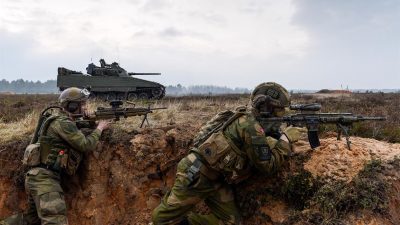UPDATED: More than 200 men and women in the Norwegian Army have arrived in Lithuania in recent weeks. They’re part of NATO’s “Enhanced Forward Presence” operation, which involves troop placement in NATO’s Baltic member states bordering on Russia.

The operation, also called “eFP,” was formed in response to Russia’s highly contended annexation of Crimea and intervention in Ukraine. NATO’s Norwegian secretary general, Jens Stoltenberg, was back on national radio in Norway Tuesday morning, insisting that the NATO troop placement is not meant to be a “provocation,” but rather a reaction to the uneasiness caused by the Russian border crossings in 2014.
All told, NATO now has around 4,000 battle-ready soldiers now placed near the borders between Russia and Estonia, Latvia, Lithuania and Poland. Stoltenberg told Norwegian Broadcasting (NRK) that the positioning was merely “a response to Russia’s aggressive policies” as he met and greeted soldiers in Latvia on Tuesday. Next door, in Lithuania, Norwegian soldiers were settling in to their new assignments.
“It’s important for us to be part of the reassuring measures that our allies in the East wanted,” Norwegian Defense Minister Ine Eriksen Søreide told Norwegian Broadcasting (NRK) last fall, when the troop placement plans were first confirmed. The Norwegian soldiers will be part of a new NATO battalion led by Germany.
“We wanted to continue the good cooperation we had with Germany and then we chose Lithuania, where Germany has taken on responsibility to be the lead nation,” Eriksen said. “Germany is among our closest allies, and we are constantly developing our cooperation.” German Chancellor Angela Merkel also played a key role in recruiting Stoltenberg to his post as NATO’s chief.

NATO members agreed at their summit last summer to station soldiers in Poland, Latvia and Estonia as well as Lithuania. All are former members of the Soviet Union with a recent history of being occupied by Russian forces from the end of World War II until the Soviet Union collapsed in the early 1990s. All later joined both the EU and the NATO alliance after winning their independence, and NATO now helps provide their defense.
Norway has had troops in the Baltic countries before, with responsibility for NATO’s air force patrols in the area in 2015. While critics have claimed the “eFP” program will have little military effect, Søreide and her ministry disagree. Most of the Norwegian soldiers taking part are attached to Norway’s elite Telemark Battalion, backed by the Northern Brigade, which includes military police, engineers and logistical support.
The Norwegians have with them a variety of tanks, terrain vehicles, and other equipment for the assignment that will run through the end of the year at the Lithuania garrison of Rukla, around 90 kilometers from the country’s capital of Vilnius. Military officials also claim the NATO assignment will provide important training exercises for the Norwegian troops, who will be working not just with the Germans but Belgian and Dutch troops as well.
Karsten Friis of Norway’s foreign policy institute NUPI isn’t convinced the operation will have any real military effect. “These are small forces in the greater context,” Friis told NRK. “From a military point of view, it’s peanuts. If Russia were to roll in, a force like this wouldn’t be able to stop it.” For that, the NATO members must rely on the US’ roughly 5,000 troops already placed in Eastern Europe and rotating among the countries.
Friis noted, however, that “the political and symbolic value of this brigade is important.” The Baltic countries, he said, “feel an existential threat from Russia,” and that in order to reassure them, “NATO went along with placing troops.”
newsinenglish.no/Nina Berglund

